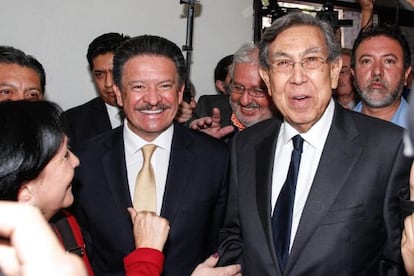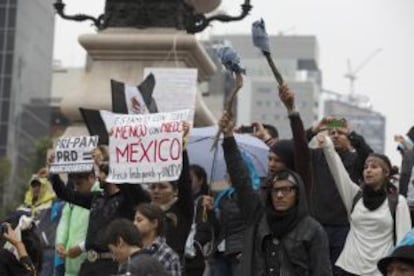Moral light of Mexico’s left walks out on the party he founded
Cuauhtémoc Cárdenas disagrees with the way current leaders are running the PRD


They arrived, they exchanged greetings, they talked, and things remained just the way they were – which is to say, in bad shape.
The public showdown between the erstwhile moral leader and founder of the Party of the Democratic Revolution (PRD), Cuauhtémoc Cárdenas, and the current party president, Carlos Navarrete, underscored how the crisis that is eating up Mexico’s predominant leftist group has entered a downward spiral that will be hard to slow down.
Just hours after the widely anticipated meeting, Cárdenas — who created the party in 1989, and ran twice in presidential elections — announced in a letter that he was leaving the PRD.
The atmosphere was already pretty heated going into the one-on-one meeting
Although his organic weight within the party is minimal, his departure leaves the PRD without a moral reference point at a time when it is already in the grip of a violent crisis after allowing the bloodthirsty mayor of Iguala to join their ranks and being so slow at ejecting the governor of Guerrero, Ángel Aguirre, a political dinosaur under whose rule the state fell into the hands of the drug lords.
The atmosphere was already pretty heated going into the one-on-one meeting. Cárdenas, son of the legendary general Lázaro Cárdenas, who nationalized the oil industry in 1938, had asked for the resignation of the entire PRD leadership in an open letter.
The party is currently controlled by a current known as Nueva Izquierda (New Left), defined by its pragmatism and tireless deal-making aimed at expanding its scope of power.
Besides the Iguala scandal, Navarrete and his team have been attacked for this alleged ideological betrayal caused by their numerous electoral alliances with parties to the left and the right of the political spectrum. They have also been accused of perpetuating a patronage system.
Navarrete’s response was to challenge Cárdenas to a verbal duel, which the latter accepted as long as it was in front of the media. The meeting took place at Valentín Campa Auditorium, in Mexico City.

Navarrete immediately pre-empted any questions about the case of the trainee teachers by stating that “we are ashamed of what happened in Iguala. It pains us that a candidate who was backed by the PRD was co-opted by organized crime and that we now have 43 missing students. We are hurt by what happened, it affects us.”
The party leader then attacked the “failed” security policies of President Enrique Peña Nieto, of the Institutional Revolutionary Party (PRI) and warned against the use of military forces in police operations.
Cárdenas tried to aim higher by asking for an institutional party renewal that will restore the PRD’s lost credibility. He also lamented the party’s “absence” from the protests taking place across Mexico these days.
Navarrete said party members were indeed present at several demonstrations, though he admitted that he has avoided marching at the head of the protests over the Iguala case. Speaking in calm tones, the party president prevented the meeting from descending into hand-to-hand combat, and even sent out a conciliatory message toward the end.
Cárdenas warned that he was considering walking out on the PRD. Just hours later, he did just that
“In 25 years we have had more agreements than disagreements,” he told Cárdenas. “This is your party: let us talk. You can be certain that I am the president of all PRD members, not just one current.”
The moral leader of the Mexican left did not let his guard down, and insisted on the need to recover the party’s lost credibility. Once the meeting ended, Cárdenas warned that he was considering walking out on the PRD. Just hours later, he did just that.
The announcement came in the shape of a letter addressed to the PRD’s national council. In it, Cárdenas said he disagreed with the way Navarrete is leading the party, and that he had waited in vain for an internal debate following his earlier open letter.
“Faced with the choice of sharing responsibility for decisions that were made out of short-sightedness or self-complacency, with no hint of self-criticism, or being criticized myself, I opted for the latter [...] and for making decisions based on the principles that I have upheld,” reads what amounts to his farewell to the PRD.
Tu suscripción se está usando en otro dispositivo
¿Quieres añadir otro usuario a tu suscripción?
Si continúas leyendo en este dispositivo, no se podrá leer en el otro.
FlechaTu suscripción se está usando en otro dispositivo y solo puedes acceder a EL PAÍS desde un dispositivo a la vez.
Si quieres compartir tu cuenta, cambia tu suscripción a la modalidad Premium, así podrás añadir otro usuario. Cada uno accederá con su propia cuenta de email, lo que os permitirá personalizar vuestra experiencia en EL PAÍS.
¿Tienes una suscripción de empresa? Accede aquí para contratar más cuentas.
En el caso de no saber quién está usando tu cuenta, te recomendamos cambiar tu contraseña aquí.
Si decides continuar compartiendo tu cuenta, este mensaje se mostrará en tu dispositivo y en el de la otra persona que está usando tu cuenta de forma indefinida, afectando a tu experiencia de lectura. Puedes consultar aquí los términos y condiciones de la suscripción digital.








































